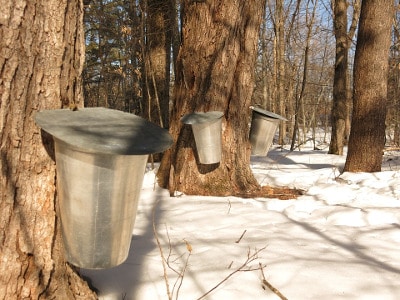Maple syrup has potential benefits for Alzheimer patients, studies say

 A recent meeting of the American Chemical Society presented two new studies on the health benefits of maple syrup, where researchers are investigating the neuroprotective properties of maple syrup extracts and potentially establishing their benefits for the treatment of brain disorders such as Alzheimer’s.
A recent meeting of the American Chemical Society presented two new studies on the health benefits of maple syrup, where researchers are investigating the neuroprotective properties of maple syrup extracts and potentially establishing their benefits for the treatment of brain disorders such as Alzheimer’s.
In one study by Dr. Donald Weaver of the Krembil Research Institute of the University of Toronto, a maple syrup extract was found to help prevent the misfolding and clumping of two types of proteins within brain cells – a process that has been linked to the progression of Alzheimer’s disease.
In the second study presented by Dr. Navindra P. Seeram from the College of Pharmacy, University of Rhode Island, pure maple syrup extracts displayed neuroprotective properties in regard to the microglial brain cells of rodents. The decrease in function of these cells has been connected to Alzheimer’s as well as other brain disorders.
“In preliminary laboratory-based Alzheimer’s disease studies, phenolic-enriched extracts of maple syrup from Canada showed neuroprotective effects, similar to resveratrol, a compound found in red wine,” said Dr. Seeram. “However, further animal and eventually human studies are required to confirm these initial findings.”
According to the Alzheimer Society of Canada, 747,000 Canadians were living with Alzheimer’s and other dementias as of 2011, making up 14.9 per cent of Canadians aged 65 years and older. And as the baby boomer cohort makes its way into its sunset years, the number of Canadians suffering from Alzheimer’s and other dementias will keep increasing, putting further strains on Canadian families and the Canadian health care system.
Maple syrup is made from the sap of sugar maples and other maple trees native to Eastern Canada and the northeastern United States and represents a $145 million economy in Canada, with most of the production coming from the province of Quebec, where according to the Federation of Quebec Maple Syrup Producers, there are currently up to 7,300 businesses and workers in the maple syrup industry.
This year’s warmer winter has prompted syrup producers to start tapping trees earlier than usual – late February for some – and to finish the sap run earlier, too. The process for creating maple syrup requires a particular balance of warm days and cold nights so that water is drawn up from the earth at night and then pushed down the tree (and out the tapper’s spout in the form of sap) during the day.
Last March and April was especially good for producing maple syrup but this year, without the colder nighttime temperatures, some producers are saying the season is pretty much over. In an interview with CBC, Kevin Snyder of Snyder Heritage Farms east of Waterloo, Ontario, says, “It’s way too warm for what maple syrup producers like to see. We’re not done yet but unfortunately we can almost see the end, I think.”
Recently, the University of Massachusetts Amherst announced that a research team led by U Mass plant ecologist Krsitina Stinson has received a two-year $149,800 (USD) grant to study the effects of climate change on the composition, quantity and quality of sugar maple sap. The research will investigate how warming trends are affecting the sap’s phytochemicals – the secondary chemicals that give natural products such as maple sap their distinctive flavour and colour. Stinson says she aims, “to get a handle on how much variation there is in this secondary chemistry, the different concentrations of phytochemicals and the relationship to syrup quality in sugar and red maples across the landscape.”

